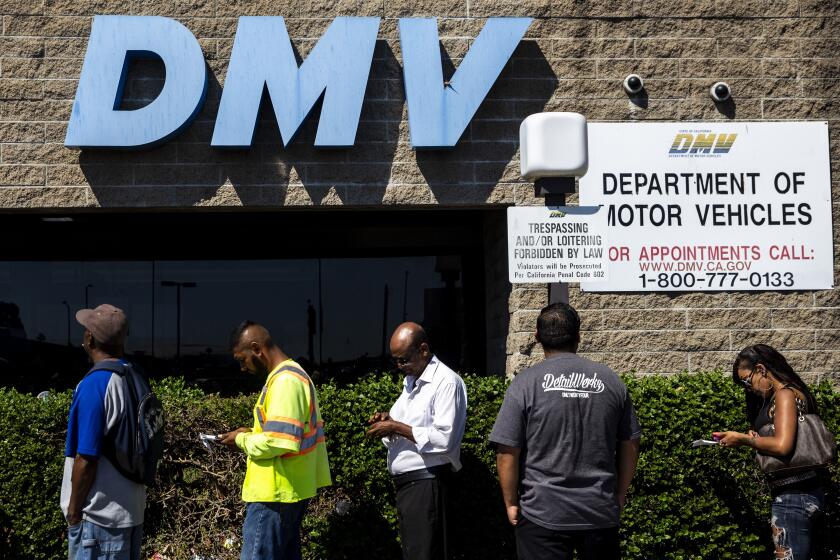Op-Ed: Trumpcare will make it even harder for millions of California’s kids to graduate and get jobs
The latest report from the Congressional Budget Office once again exposes the sharp and bitter truth about the House Republican efforts to “repeal and replace” President Obama’s Affordable Care Act. The American Health Care Act — now in the hands of the Senate — represents a glaring transfer of wealth, security and opportunity from low-income to high-income individuals.
Should the AHCA or anything close to it become law, the students we serve in the California State University system and California Community Colleges system will be among the hardest hit.
Almost 2.5 million students are enrolled at a Cal State campus or a California community college. They come predominantly from lower-income families. In both systems, about two-thirds of students work, many full time, supporting themselves and often their families. In the CSU system, more than 60% have taken out loans and more than half qualify for low-income grants. At the state’s community colleges, about half the students come from households with incomes of less than $30,000. In both systems, the students are highly diverse, although they seem to have one thing in common: a desire to ensure their future and improve their economic circumstances.
The AHCA trades benefits for low-income Americans for tax benefits to high-income Americans.
Obamacare offered our students real help in achieving that goal. Most importantly, it greatly expanded Medicaid — Medi-Cal in California — and it also provided generous subsidies that helped families and individuals purchase insurance in the Covered California marketplace. These benefits removed one more socioeconomic barrier to our students’ ability to earn a degree and to their future economic success.
Before Obamacare, a survey of CSU students indicated that 25% to 30% were uninsured. At Cal State L.A. alone the percentage was 35%. By the end of the second Obamacare enrollment period, less than 10% of CSU students overall and at Cal State L.A. were uninsured. Put another way: Approximately 80,000 more CSU students were covered than in the pre-Obamacare days. Just as striking, 40% of surveyed CSU students reported that a member of their family, other than themselves, were able to sign up for health insurance under the law.
Although there is no comparable data on community college students, given what we know about their individual and family incomes, there is every reason to assume that the reductions of the numbers of uninsured students there have also been substantial.
The AHCA would largely obliterate these gains. According to the CBO score, it would reduce federal government spending on Medicaid and insurance subsidies by a staggering $1.5 trillion over the next 10 years, replacing some of that with a new health insurance tax credit. But unlike Obamacare, in which subsidy dollars are targeted to those most in need, much of the new credit would benefit higher-income individuals. The savings generated by the reductions would go to eliminating Obamacare taxes on the wealthy.
The end result? By 2018, 14 million more Americans will be uninsured; by 2026, 23 million more will be added to that total. The tradeoff is painfully transparent: low-income Americans lose, high-income Americans gain.
Just as perniciously, the AHCA ignores the long-term costs of its rollbacks. To the extent that a lack of health insurance impedes our students’ ability to graduate and get work, it also increases the overall need for subsidized healthcare. Research shows that many students at the community college level will see their incomes increase 50% or more just two years after graduating. With a good job, these graduates will no longer need taxpayer help paying for insurance. They will contribute more in state and federal taxes and return the nation’s investment in them many times over.
Fortunately, the AHCA is not yet law, and a number of Republican senators appear concerned about its dramatic cuts in healthcare accessibility. But even a less onerous version of the act would almost certainly have a substantial negative effect on our students and millions of other Americans. Its passage would represent a rejection of core American values regarding equality of opportunity, something that should concern us all.
Walter Zelman is chairman of the Department of Public Health at Cal State L.A. Tom Epstein is vice president of the California Community Colleges Board of Governors and the former vice president of public affairs for Blue Shield of California.
Follow the Opinion section on Twitter @latimesopinionand Facebook
More to Read
A cure for the common opinion
Get thought-provoking perspectives with our weekly newsletter.
You may occasionally receive promotional content from the Los Angeles Times.









